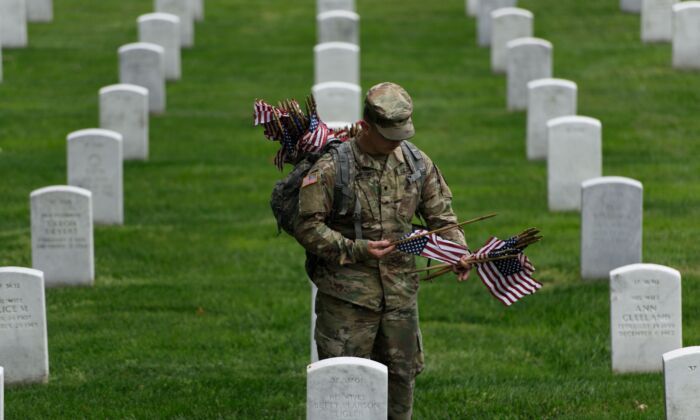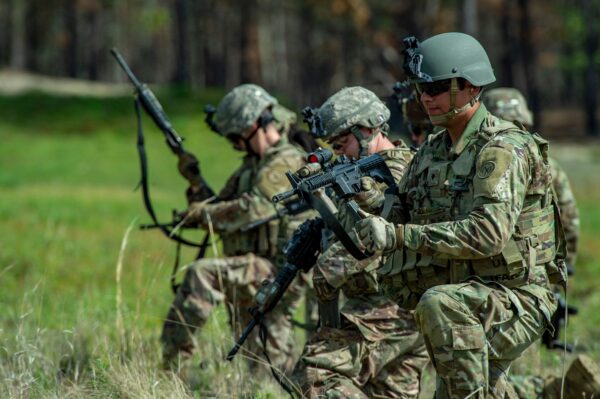Suicide Rates Among US Army Soldiers Highest in More Than 80 Years

The Epoch Times - By Autumn Spredemann August 2, 2022
The U.S. Army lost 176 active duty soldiers to suicide in 2021, figures show.
According to combined data from the Defense Suicide Prevention Office and a study published in the Journal of the American Medical Association, that’s the highest number of active duty Army member suicides on record since 1938.
Suicide rates within all military branches have continued to rise since 2015.
Compounding this trend is the number of U.S. soldiers and veterans who have taken their own life in post-9/11 wars.

Brown University published a study indicating that 30,177 active duty members and veterans have committed suicide. By comparison, the number of soldiers actually killed in post-9/11 war operations is 7,052.
Some experts say physically and mentally demanding industries like the military put people at an elevated risk for developing Post Traumatic Stress Disorder (PTSD). It’s one of the few mental health disorders that can be linked to a specific event.
“PTSD can also occur when you experience constant high-stress situations,” Dr. Danielle McGraw told The Epoch Times.
McGraw is a licensed clinical psychologist and the owner of Flourish Mental Wellness in Scottsdale, Arizona. She has also worked with both active and veteran military members struggling with PTSD.
She says when people are feeling stressed, it can lead to feelings of hopelessness about their situation, which can spiral into thoughts of self-harm.
Another contributing factor is feelings of shame, which often factor into someone’s decision to take their own life.
Feeling Like a Pawn
U.S. Army veteran Jonah Nelson told The Epoch Times that discussion of military suicides is often a shunned topic.
A former Army engineer, Nelson was deployed to Iraq and Saudi Arabia during the U.S. Gulf War operations Desert Shield and Desert Storm in the early 1990s.
He wasn’t surprised to learn that his service branch’s active duty member suicide rates are at a historic high.
“As of now, they don’t have any reliable method of fixing us,” he said.
Further, Nelson noted that soldiers are often put in situations that can take a harsh toll on mental health.
He remembers how members of his platoon had to extract human remains from bombed-out vehicles. Nelson says the soldiers involved returned to the base at the end of the day looking “different.”
“I guess you just don’t talk about that kind of stuff,” he said.
Mental health experts have heard concerning commentary from other military veterans in recent years.
Dr. Tracy Latz is an integrative psychiatrist and author with 35 years of experience dealing with suicide risk and PTSD suffering patients. She told The Epoch Times feelings of a lack of purpose also contribute to the problem.
“Veterans I have seen over the past few years report feeling like they and their comrades were used primarily as pawns for governmental political power rather than feeling [a] sense of real purpose in their duties.”
Red Flags
Compounding this, service members’ isolation and loneliness while stationed overseas or deployed to combat zones can be crushing.
A Blue Star Families Military Lifestyles survey from 2021 shows eight out of 10 active duty respondents have been separated from their families in the past 18 months. Moreover, 31 percent have been away for six months or longer.
The Department of Defence (DOD) began releasing an Annual Suicide Report in January 2019 as a means to track the escalating problem.
“The department is fully committed to preventing suicides in our military community. Every death by suicide is a tragedy,” the DOD posted on its website for the office of suicide prevention.
Combined with the United States Department of Veterans Affairs (VA) and United Service Organizations (USO), free tools like crisis hotlines for military members struggling with mental health.
Suicide Rates Among US Army Soldiers Highest in More Than 80 Years

By Autumn Spredemann
The U.S. Army lost 176 active duty soldiers to suicide in 2021, figures show.
According to combined data from the Defense Suicide Prevention Office and a study published in the Journal of the American Medical Association, that’s the highest number of active duty Army member suicides on record since 1938.
Suicide rates within all military branches have continued to rise since 2015.
Compounding this trend is the number of U.S. soldiers and veterans who have taken their own life in post-9/11 wars.
![GettyImages-1240721813-600x399 Suicide Rates Among US Army Soldiers Highest in More Than 80 Years Featured Top Stories U.S. [your]NEWS GettyImages-1240721813-600x399 Suicide Rates Among US Army Soldiers Highest in More Than 80 Years Featured Top Stories U.S. [your]NEWS](https://img.theepochtimes.com/assets/uploads/2022/06/06/GettyImages-1240721813-600x399.jpg)
Brown University published a study indicating that 30,177 active duty members and veterans have committed suicide. By comparison, the number of soldiers actually killed in post-9/11 war operations is 7,052.
Some experts say physically and mentally demanding industries like the military put people at an elevated risk for developing Post Traumatic Stress Disorder (PTSD). It’s one of the few mental health disorders that can be linked to a specific event.
“PTSD can also occur when you experience constant high-stress situations,” Dr Danielle McGraw told The Epoch Times.
McGraw is a licensed clinical psychologist and the owner of Flourish Mental Wellness in Scottsdale, Arizona. She has also worked with both active and veteran military members struggling with PTSD.
She says when people are feeling stressed, it can lead to feelings of hopelessness about their situation, which can spiral into thoughts of self-harm.
Another contributing factor is feelings of shame, which often factor into someone’s decision to take their own life.
Feeling Like A Pawn
U.S. Army veteran Jonah Nelson told The Epoch Times that discussion of military suicides is often a shunned topic.
A former Army engineer, Nelson was deployed to Iraq and Saudi Arabia during the U.S. Gulf War operations Desert Shield and Desert Storm in the early 1990s.
He wasn’t surprised to learn that his service branch’s active duty member suicide rates are at a historic high.
“As of now, they don’t have any reliable method of fixing us,” he said.
Further, Nelson noted that soldiers are often put in situations that can take a harsh toll on mental health.
He remembers how members of his platoon had to extract human remains from bombed-out vehicles. Nelson says the soldiers involved returned to the base at the end of the day looking “different.”
“I guess you just don’t talk about that kind of stuff,” he said.
Mental health experts have heard concerning commentary from other military veterans in recent years.
Dr. Tracy Latz is an integrative psychiatrist and author with 35 years of experience dealing with suicide risk and PTSD suffering patients. She told The Epoch Times feelings of a lack of purpose also contribute to the problem.
“Veterans I have seen over the past few years report feeling like they and their comrades were used primarily as pawns for governmental political power rather than feeling [a] sense of real purpose in their duties.”

By Autumn Spredemann
The U.S. Army lost 176 active duty soldiers to suicide in 2021, figures show.
According to combined data from the Defense Suicide Prevention Office and a study published in the Journal of the American Medical Association, that’s the highest number of active duty Army member suicides on record since 1938.
Suicide rates within all military branches have continued to rise since 2015.
Compounding this trend is the number of U.S. soldiers and veterans who have taken their own life in post-9/11 wars.
![GettyImages-1240721813-600x399 Suicide Rates Among US Army Soldiers Highest in More Than 80 Years Featured Top Stories U.S. [your]NEWS GettyImages-1240721813-600x399 Suicide Rates Among US Army Soldiers Highest in More Than 80 Years Featured Top Stories U.S. [your]NEWS](https://img.theepochtimes.com/assets/uploads/2022/06/06/GettyImages-1240721813-600x399.jpg)
Brown University published a study indicating that 30,177 active duty members and veterans have committed suicide. By comparison, the number of soldiers actually killed in post-9/11 war operations is 7,052.
Some experts say physically and mentally demanding industries like the military put people at an elevated risk for developing Post Traumatic Stress Disorder (PTSD). It’s one of the few mental health disorders that can be linked to a specific event.
“PTSD can also occur when you experience constant high-stress situations,” Dr Danielle McGraw told The Epoch Times.
McGraw is a licensed clinical psychologist and the owner of Flourish Mental Wellness in Scottsdale, Arizona. She has also worked with both active and veteran military members struggling with PTSD.
She says when people are feeling stressed, it can lead to feelings of hopelessness about their situation, which can spiral into thoughts of self-harm.
Another contributing factor is feelings of shame, which often factor into someone’s decision to take their own life.
Feeling Like A Pawn
U.S. Army veteran Jonah Nelson told The Epoch Times that discussion of military suicides is often a shunned topic.
A former Army engineer, Nelson was deployed to Iraq and Saudi Arabia during the U.S. Gulf War operations Desert Shield and Desert Storm in the early 1990s.
He wasn’t surprised to learn that his service branch’s active duty member suicide rates are at a historic high.
“As of now, they don’t have any reliable method of fixing us,” he said.
Further, Nelson noted that soldiers are often put in situations that can take a harsh toll on mental health.
He remembers how members of his platoon had to extract human remains from bombed-out vehicles. Nelson says the soldiers involved returned to the base at the end of the day looking “different.”
“I guess you just don’t talk about that kind of stuff,” he said.
Mental health experts have heard concerning commentary from other military veterans in recent years.
Dr Tracy Latz is an integrative psychiatrist and author with 35 years of experience dealing with suicide risk and PTSD suffering patients. She told The Epoch Times feelings of a lack of purpose also contribute to the problem.
“Veterans I have seen over the past few years report feeling like they and their comrades were used primarily as pawns for governmental political power rather than feeling [a] sense of real purpose in their duties.”